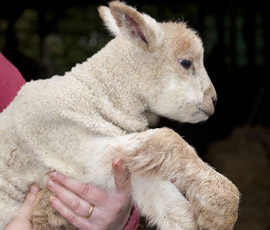Farmers to bear financial burden of Schmallenberg

The Schmallenberg virus is here to stay and with no immediate timetable for a vaccine farmers will have to bear the financial burden of the disease, warn government veterinary experts.
The Veterinary Medicines Directorate (VMD) is currently assessing a candidate vaccine produced by MSD Animal Health that has been shown to protect pregnant calves, lambs and ewes from the Schmallenberg virus.
The company submitted an application for regulatory approval and licensing of the vaccine for commercial use last September.
However, nearly six months later, there are no signs of any commercial vaccine and farmers, who have been reporting increasing losses to Schmallenberg this season, have been told that the government will not intervene to hurry the process along.
“I think it’s important that the process in which a vaccine gets approved is not something which my role, or a minister’s role, is appropriate to comment on,” Dr Simmons told a House of Commons Environment, Food and Rural Affairs Committee meeting this week.
“It is a process that needs to follow a tried and tested and properly legal method, which is open to appropriate scrutiny by the veterinary products committee.”
The development of a vaccine for Schmallenberg virus was something for consideration between commercial pharmaceutical companies, researchers and the regulator, the VMD, he added. “It is not the role of DEFRA or other elements of government to develop a vaccine for this disease.”
And Dr Simmons told the panel there were no plans for the government to underwrite the costs of vaccine supplies for farmers. “There are no plans to underwrite the purchase of a vaccine if and when a vaccine is approved,” he confirmed.
One panel member said it was no good for the government to rid its hands and hope the disease would just go away when farmers were struggling.
But Dr Simmons said he believed the disease, either through vaccination or by natural spread, would become less of a problem over time due to immunity building up in infected flocks and herds.
“The quicker and faster this disease spreads and the larger it spreads over a geographical area, the better it will be, in as much as the majority of animals within a given population will be exposed and become immune,” he said.
“While we don’t know how long that immunity will last, we know it lasts at least one season and quite possibly may last a number of years.”
“Already in the areas which have been infected, in northern Europe and to a certain extent south-east England, the disease is less than it was last year,” he added.
Trevor Drew, lead scientist and head of virology at the Animal Health and Veterinary Laboratories Agency (AHVLA), agreed it was likely that farmers would have to bear the financial burden of the disease.
“Even if we had some national campaign, it would be quite simple that infected midges would get blown over and of course, we cannot control the disease in wild deer,” said Prof Drew.
Currently, there is no compensation for farmers whose animals infected with Schmallenberg virus, which DEFRA still considers a “low impact disease”. This is despite reports of up to 50% lamb losses this season, costing businesses thousands of pounds.
Dr Simmons insisted that the cost of Schmallenberg virus was “substantially less” than the majority of endemic diseases which plague the national flock and herd.
The latest AHVLA figures show that 1,211 confirmed cases of the virus in cattle and sheep in England, Scotland and Wales.
But Dr Simmons admitted that because Schmallenberg virus was not a notifiable disease, the potential for under-reporting of cases was high.
He said the figures were “almost certainly a substantial underestimate of the number of herds and flocks that have been exposed to infection” as there was “evidence of infection in every English county”.
Prof Drew said he did not believe that Schmallenberg virus had influenced the recent collapse in lamb prices. “Over-supply, a particularly poor forage year and a number of other factors have contributed to this.”
No restrictions between EU member states have been placed on the movement of animals or infected with Schmallenberg or meat derived from infected ruminants. However, Russia has imposed a ban of sheep and sheep imports from affected countries, including the UK.
Dr Simmons said there were very few – if any – legitimate reasons for imposing restrictions on germplasm (embryos and semen) and/or live animals, provided a handful of conditions were satisfied.
An EU-wide risk assessment has concluded that the Schmallenberg virus poses no risk to people and there is no evidence of disease transmission from drinking milk or eating meat from infected animals.
Schmallenberg virus was discovered in Germany in November 2011 and has spread to herds and flocks throughout the UK and Europe. It is transmitted by biting insects and causes miscarriages and birth defects in sheep, cattle and goats.
Sheep crisis: Farm leaders meet minister
